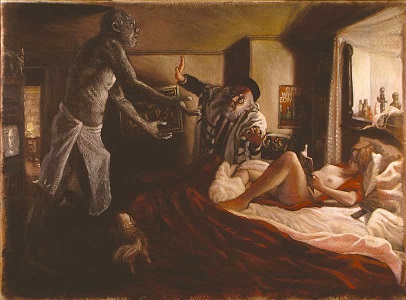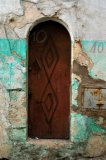The Golem
Jorge Luis Borges

If (as the Greek affirmed in the Cratylus)
the name is archetype of the thing
in the letters of �rose� is the rose
and all the Nile in the word �Nile�.
And, made of consonants and vowels,
there'll be a terrible Name, which
guards in precise letters and syllables
the ciphered essence of God and the Omnipotence.
.
Adam and the stars knew it
in the garden. The corrosion of sin
(the qabalists say) has erased it,
And the generations have lost it.
The artifices and candor of man
are endless. We know there was a day
when God�s people were seeking the Name
in the solemn vigils of Jewry.
Not in the way of others where an obscure
shadow insinuates in the obscure history,
still young and alive is the memory
of Judah Loew, who was a rabbi in Prague.
Thirsting to know what God knows,
Judah Loew arranged permutations
of letters and complex variations
and finally pronounced the Name: the Key,
the Door, the Echo, the Guest and the Palace,
over a doll which with clumsy hands
he carved, to teach it the secrets
of the Letters, of Time and of Space.
The simulacrum lifted its sleepy
lids and saw forms and colors
it did not understand, and lost in sounds
it rehearsed fearful movements.
Gradually, it saw itself (as do we)
imprisoned in this sonorous web
of Before, After, Yesterday, Meanwhile, Now,
Right, Left, I, You, Those, Others.
(The qabalist who presided as numen
named the immense creature Golem;
these truths are given by Scholem,
in a learned part of his volume.)
The rabbi explained to it the universe
�This is my foot, this is yours, this the rope.�
And after years got the perverse creature
To sweep the synagogue, well or badly.
Perhaps twas an error in penmanship
or in pronouncing the Sacred Name,
for despite such avid enchantment,
the apprentice of man learned not to speak.
Its eyes, less of man than of dog,
and even less of dog than of thing,
followed the rabbi around the pallid
penumbra of the confining rooms.
Something abnormal and gross was in the Golem.
because the Rabbi�s cat at its passing
would hide. (This cat is not in Scholem,
But in the passing of time I divine it.)
Lifting filial hands to its God
it copied its own god's devotions;
or, stupid and smiling, it would bow
in concave oriental salaams.
The Rabbi observed it with tenderness
and with some horror. �How� (he asked)
�could I beget this sorry son
and abandon inaction, wherein sanity lies?�
�Why did I add to the infinite
series another symbol? Why to the vain
skein that winds in the eternal
did I give another cause, an effect, and grief?�
In the hour of anguish and lack of light,
his eyes on his Golem would rest.
Who will tell us the things God felt
when looking at his rabbi in Prague?
Translator's note: Lost in translation. This poem is replete with rhythm and a strict a-b-b-a rhyming pattern. Regrettably, it is impossible to reproduce in translation.
Frank Thomas Smith
Espa�ol
Home
